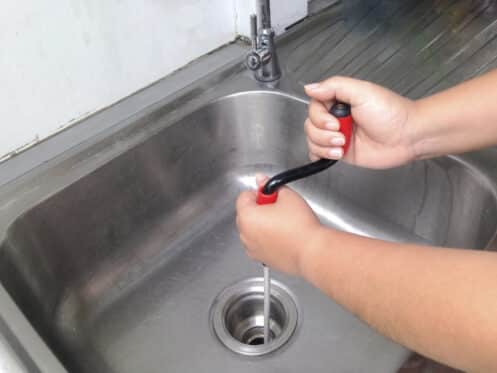Bathroom Plumbing Basics: Top Tips for New Homeowners
Bathroom Plumbing Basics: Top Tips for New Homeowners
Blog Article
Everybody seems to have their private conception on the subject of 6 Essential Plumbing Checks for New Homeowners.

For brand-new home owners, understanding and keeping shower room plumbing can save both time and money by avoiding pricey concerns down the line. Below are some important restroom plumbing ideas to assist you maintain every little thing running efficiently.
Get Ready For Winter
Shield your pipes from cold throughout cold weather by insulating pipelines in unheated locations like cellars, attics, and garages. Throughout extreme cool, let cold water drip from taps served by revealed pipes to help protect against freezing.
Set Up Routine Upkeep
Think about scheduling annual examinations with a certified plumber. They can detect issues that you may miss, such as concealed leaks or wear and tear on pipelines and fixtures. Routine upkeep assists expand the life of your pipes system and can protect against emergencies.
Familiarize Yourself with the Key Shut-Off Valve
Understanding where the major water shut-off shutoff is located in your home is important. This permits you to rapidly shut off the water system in case of major leaks or during pipes emergency situations, preventing comprehensive water damage.
On A Regular Basis Evaluate for Leakages
Tiny leaks can bring about big troubles. Routinely examine under sinks, around toilets, and near plumbing components for any type of signs of leaks. Seek dampness, small drips, or rust. Catching and fixing leakages early can protect against much more major damages and conserve water.
Maintain Your Water Heater
Ensure your water heater is set to a proper temperature level (normally about 120 levels Fahrenheit) to prevent scalding and minimize power use. Flush the container yearly to eliminate debris build-up, which can lower the performance and lifespan of your heating unit.
Upgrade Your Components
If your home has older components, take into consideration updating to extra reliable versions. Modern toilets, showerheads, and faucets are developed to utilize much less water while supplying great pressure, which can substantially minimize your water expense and environmental footprint.
Be Cautious with DIY Plumbing Repairs
While it's tempting to deal with all home repair services by yourself, be cautious with pipes. Some problems may need expert expertise, particularly if they include primary water lines or sewer repairs. Hiring an expert can often be much more affordable than DIY, specifically if it avoids further damages.
Do Not Neglect Slow Drains
If your sink or bathtub is draining pipes gradually, it's commonly an indication of a blockage developing. Addressing this early can avoid a full clog. Use a bettor or a plumber's serpent to remove particles. Stay clear of utilizing chemical drain cleansers as they can harm your pipes over time.
Know What Not to Flush
Commodes are not waste disposal unit. Prevent flushing anything apart from bathroom tissue and human waste. Things like wipes, feminine health items, and cotton bud must be taken care of in the garbage to avoid clogs and sewer backups.
Install Strainers in Drains
Place filters in your sink and tub drains to catch hair and other particles before they enter your pipes system. Cleaning up the filters on a regular basis will assist stop buildup and maintain water moving freely.
Verdict
Understanding and keeping your home's bathroom pipes can prevent lots of usual issues. By complying with these important tips, you can guarantee your washroom remains practical and reliable, saving you time and money in the future.
Essential Plumbing Tips for Homeowners: Keep Your Pipes Flowing Smoothly
As a homeowner, understanding the basics of your plumbing system can save you time, money, and a lot of headaches. Plumbing issues can range from minor annoyances like dripping faucets to major problems like burst pipes that cause significant damage. This guide provides essential tips to help you maintain your plumbing system and tackle common issues.
Understanding Your Plumbing System
Supply System: Brings fresh water into your home from a municipal source or a well. Drain-Waste-Vent System: Removes wastewater and vents sewer gases outside. Fixtures and Appliances: Includes sinks, toilets, showers, dishwashers, and washing machines. Basic Maintenance Tips
Regular Inspections: Periodically check for leaks, corrosion, and other signs of wear and tear. Look under sinks, around toilets, and near water heaters. Know Your Main Shut-Off Valve: In case of a major leak, you’ll need to shut off the water quickly. Ensure everyone in your household knows where the main shut-off valve is located. Prevent Frozen Pipes: In cold climates, insulate exposed pipes and let faucets drip during extreme cold to prevent freezing. Use Strainers: Install strainers in sinks and tubs to catch hair, food particles, and other debris that can cause clogs. Common Plumbing Issues and Solutions
Clogged Drains:
Prevention: Avoid pouring grease down the drain and use drain screens to catch debris. DIY Fix: Use a plunger or a plumbing snake to clear minor clogs. For stubborn clogs, a mixture of baking soda and vinegar can sometimes help. Leaky Faucets:
Prevention: Replace washers and seals regularly. DIY Fix: Turn off the water supply, disassemble the faucet, and replace worn parts.

Try Here Report this page